Choosing the right flooring for your home is a crucial decision that goes beyond aesthetics. The type of flooring you select can significantly impact the comfort, functionality, and overall value of your living space. Whether you’re renovating or building anew, understanding the pros and cons of different flooring options is essential to making an informed choice that suits your lifestyle and budget.
In this article, we will delve into a comprehensive comparison of various flooring options available for homes. From classic choices like hardwood and tile to modern alternatives such as laminate and vinyl, each flooring type offers unique advantages and drawbacks. We will explore their durability, maintenance requirements, aesthetic appeal, and suitability for different rooms within your home.
By the end of this guide, you’ll be equipped with the knowledge needed to confidently select the best flooring option that aligns with your preferences and practical needs. Whether you prioritize elegance, durability, or ease of maintenance, understanding the nuances of each flooring type will empower you to make the right decision for enhancing your home’s comfort and functionality.
Hardwood Flooring: Characteristics, Pros, and Cons
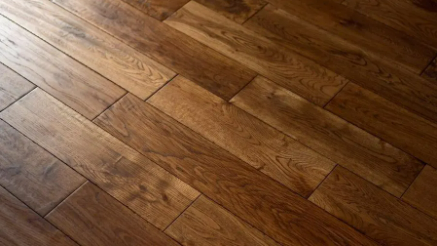
Hardwood flooring is crafted from natural hardwood species such as oak, maple, or walnut. This type of flooring exudes warmth and character, offering a timeless appeal that enhances the aesthetic of any home interior.
Pros:
- Timeless aesthetic appeal: Hardwood floors add a sense of elegance and sophistication to spaces, making them a popular choice for homeowners seeking a classic look.
- Durability and longevity: Properly maintained hardwood floors can last for decades, often outlasting other flooring options.
- Can be refinished multiple times: Unlike many flooring materials, hardwood can be sanded down and refinished several times over its lifetime, renewing its appearance and extending its usability.
Cons:
- Expensive upfront cost: Hardwood flooring tends to come with a higher initial investment compared to other flooring options, primarily due to the cost of materials and installation.
- Susceptible to scratches and moisture damage: While durable, hardwood floors are vulnerable to scratches from pets, furniture, and high-heeled shoes. They can also warp or stain if exposed to excessive moisture.
- Requires regular maintenance and refinishing: To maintain their beauty and durability, hardwood floors need regular sweeping, vacuuming, and occasional refinishing, which adds to their long-term maintenance costs.
Laminate Flooring: The Affordable and Versatile Option
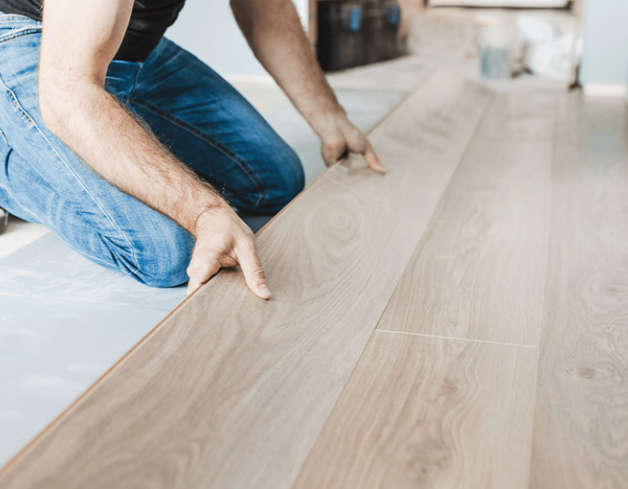
Laminate flooring is a synthetic flooring material engineered to replicate the appearance of hardwood or natural stone. It consists of multiple layers fused together through a lamination process, offering a durable and cost-effective alternative to traditional flooring options.
Pros:
- Cost-effective alternative to hardwood: Laminate flooring provides the look and feel of hardwood at a fraction of the cost, making it a budget-friendly option for homeowners.
- Resistant to scratches, fading, and stains: Its durable surface is designed to withstand heavy foot traffic and resist scratches, fading from sunlight, and stains from spills.
- Easy to install and maintain: Laminate planks typically come with a click-lock installation system, allowing for straightforward installation without the need for glue. Maintenance involves regular sweeping and occasional damp mopping.
Cons:
- Not as durable as hardwood or real stone: While durable, laminate flooring is not as robust as hardwood or natural stone and may show signs of wear over time, particularly in high-traffic areas.
- Can be noisy underfoot: Unlike carpet or vinyl, laminate flooring can produce a hollow sound or echo when walked upon, especially if installed over an uneven subfloor.
- Cannot be refinished like hardwood: Unlike hardwood floors that can be sanded and refinished to refresh their appearance, laminate flooring cannot be refinished once it starts showing signs of wear or damage.
Vinyl Flooring: The Versatile and Resilient Option for Modern Homes
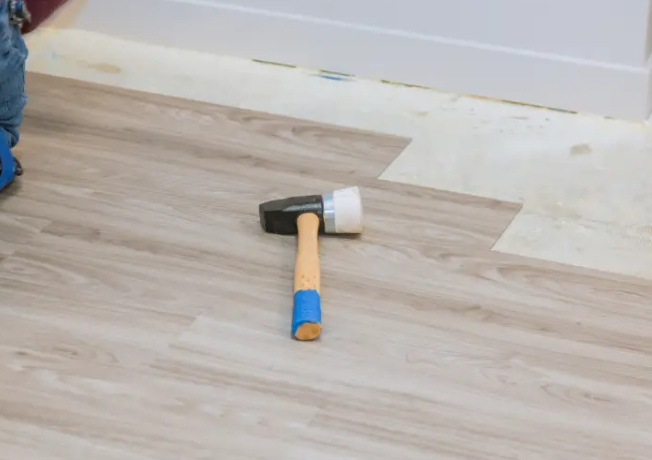
Vinyl flooring is a synthetic flooring material available in sheets, tiles, or planks. It is engineered to mimic the look of natural materials like hardwood, stone, or ceramic, offering a versatile solution for various spaces within the home.
Pros:
- Waterproof and highly durable: Vinyl flooring is inherently resistant to water, making it an ideal choice for kitchens, bathrooms, and basements where moisture is a concern. It is also highly durable and can withstand heavy foot traffic.
- Wide range of styles and colors: Available in a plethora of designs, vinyl flooring offers homeowners endless options to match their décor preferences, ranging from realistic wood grains to modern abstract patterns.
- Comfortable underfoot and quieter than laminate: Vinyl flooring provides a cushioned feel underfoot, offering comfort and reducing noise levels compared to harder flooring surfaces like laminate.
Cons:
- Can emit volatile organic compounds (VOCs): Some vinyl flooring products may release VOCs, particularly when new. It’s advisable to choose low-VOC or phthalate-free options to minimize indoor air pollution.
- Susceptible to punctures from sharp objects: While durable, vinyl flooring can be punctured or scratched by sharp objects such as high heels or pet claws, which can compromise its appearance.
- May not add as much resale value as hardwood: Despite its practical benefits, vinyl flooring may not enhance a home’s resale value as much as traditional hardwood flooring, which is often preferred by prospective buyers.
Tile Flooring (Ceramic or Porcelain): The Durable and Stylish Choice
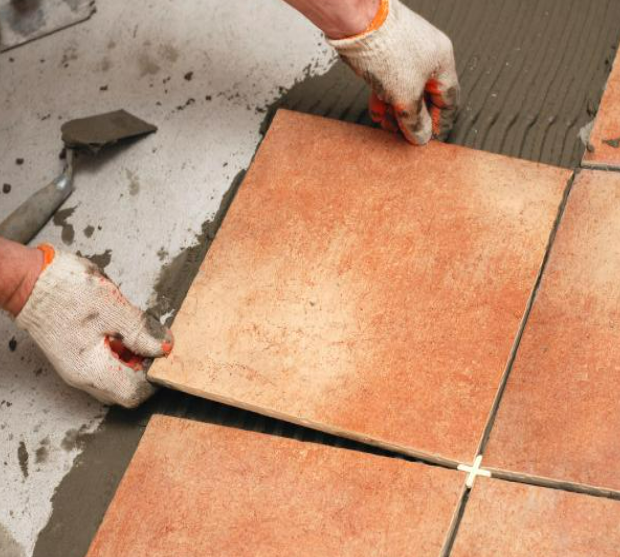
Tile flooring is crafted from ceramic or porcelain materials, offering a versatile range of options in terms of shapes, sizes, and colors. It is renowned for its durability and aesthetic appeal, making it suitable for both indoor and outdoor applications.
Pros:
- Extremely durable and water-resistant: Ceramic and porcelain tiles are highly resilient to wear and moisture, making them ideal for high-traffic areas and spaces prone to spills like kitchens and bathrooms.
- Easy to clean and maintain: The smooth, non-porous surface of tile flooring allows for easy cleaning with regular sweeping and occasional mopping. Stains and spills can be wiped away without leaving lasting marks.
- Resistant to scratches and stains: Tile flooring’s tough surface is resistant to scratches from furniture and pets, as well as stains from spills like wine or coffee.
Cons:
- Cold and hard underfoot: Unlike carpet or vinyl, tile flooring can feel cold and hard underfoot, especially in colder climates or during winter months.
- Grout lines can be difficult to clean: The grout lines between tiles can accumulate dirt and grime over time, requiring regular cleaning and maintenance to keep the floor looking pristine.
- Professional installation recommended for best results: Achieving a flawless tile installation, especially for larger areas or intricate patterns, often requires professional expertise to ensure proper alignment and grout sealing.
Carpet Flooring: The Comfortable and Cushy Flooring Option
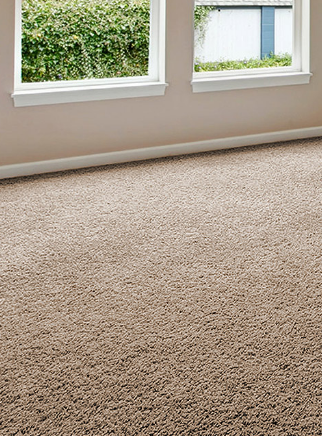
Carpet flooring is a soft floor covering made from fibers such as wool or synthetic materials. It is known for its plush texture and comes in a wide range of colors, patterns, and pile heights to suit various interior styles and preferences.
Pros:
- Provides warmth and comfort: Carpet flooring offers a soft and cushioned feel underfoot, providing warmth and comfort, especially in colder climates or during colder seasons.
- Wide variety of colors and textures: With numerous options available, homeowners can choose from a vast selection of colors, patterns, and textures to complement their décor and personal style preferences.
- Helps reduce noise and adds insulation: Carpet absorbs sound, reducing noise levels within a room. Additionally, it adds insulation, helping to maintain room temperature and reduce energy costs.
Cons:
- Prone to staining and trapping allergens: Carpet fibers can easily stain from spills and are more likely to trap dust, pet dander, and allergens compared to hard flooring surfaces. Regular cleaning and maintenance are essential to minimize these issues.
- Requires regular vacuuming and professional cleaning: To maintain its appearance and hygiene, carpet flooring needs regular vacuuming to remove dirt and debris. Periodic professional cleaning is also recommended to deep clean and refresh the carpet fibers.
- Lifespan shorter compared to hard flooring options: While durable, carpet flooring typically has a shorter lifespan compared to hard flooring options like tile or hardwood. Heavy foot traffic and improper maintenance can accelerate wear and tear.
Choosing the Right Flooring for Your Home
Selecting the right flooring for your home involves careful consideration of various factors, from aesthetic preferences to practical needs. Throughout this guide, we’ve explored five popular flooring options and their respective pros and cons:
- Hardwood Flooring: Offers timeless appeal and durability but comes with a higher upfront cost and requires maintenance.
- Laminate Flooring: Provides a cost-effective alternative to hardwood with easy installation and maintenance, though not as durable.
- Vinyl Flooring: Known for its waterproof properties and wide range of styles yet may emit VOCs and lacks the resale value of hardwood.
- Tile Flooring (Ceramic or Porcelain): Highly durable, easy to clean, and suitable for high-moisture areas, but can be cold and hard underfoot.
- Carpet Flooring: Offers warmth, comfort, and sound absorption, but requires regular cleaning and has a shorter lifespan compared to hard floors.
To choose the best flooring option for your home, consider your budget, lifestyle, and specific needs. If durability and elegance are priorities, hardwood or tile flooring may be ideal. For affordability and easy maintenance, laminate or vinyl flooring could be suitable choices. Carpet flooring, on the other hand, offers comfort and insulation benefits.
For expert guidance tailored to your home’s unique requirements, we encourage you to contact Ben Painting & Improvement, Orlando’s premium flooring services. Our professionals can provide personalized advice, ensure proper installation, and help you achieve the perfect flooring solution that enhances your home’s beauty and functionality. Make an informed decision today and transform your living space with the flooring that best suits your style and practical considerations. Your home deserves nothing less than the perfect foundation for years of comfort and enjoyment.
